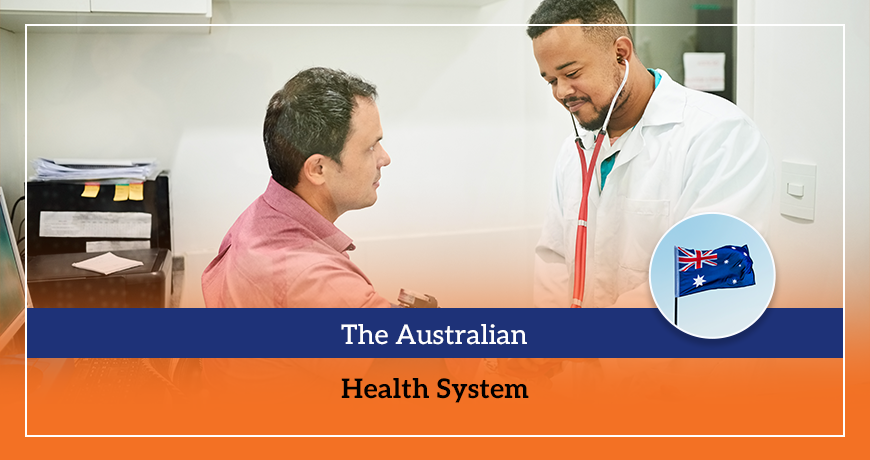Australia, with its sun-kissed beaches, vibrant cities, and world-class universities, attracts international students from across the globe. But before hopping on the plane, there's one crucial aspect to consider: health insurance.
Understanding a new healthcare system can be challenging, especially in a foreign country. Unexpected illnesses or accidents, while unforeseen, can leave you feeling overwhelmed and financially burdened. That's why having the right idea about health insurance for international students in Australia is absolutely necessary.
Basics of Health Insurance in Australia
Understanding Health Insurance in Australia
Australia boasts a two-tiered healthcare system:
- Medicare: This universal public health insurance scheme covers essential medical services for all Australian citizens and permanent residents. Think of it as your safety net, providing access to doctors, hospitals, and vital treatments.
- Private health insurance: This optional, private insurance offers additional benefits and choices, like faster access to specialists, private hospital rooms, and coverage for services not fully covered by Medicare.
How it Works for Australian Citizens
Australian citizens can take out private health insurance to supplement their Medicare coverage. It offers many benefits, such as:
- Reduced waiting times for elective surgery in private hospitals.
- Access to various specialists and treatments.
- Coverage for services not covered by Medicare, such as dental and optical care.
- Differences for International Students
Differences for international students
International students in Australia are not automatically eligible for Medicare benefits. Therefore, they are required to have Overseas Student Health Cover (OSHC) throughout their studies. OSHC is a private health insurance plan specifically designed for international students, providing coverage for:
- Medically necessary doctor consultations and treatments.
- Hospitalization in public or private hospitals (up to policy limits).
- Ambulance services.

The Australian Health System
Brief overview of the Australian Health System
Australia boasts a mixed public-private healthcare system, meaning you have choices regarding your health. At the core lies Medicare, a universal health insurance scheme government-funded through taxes.
Think of Medicare as your safety net, providing coverage for essential medical services like:
- Public hospital care: Inpatient and outpatient treatment in public hospitals, often at minimal cost.
- General practitioner (GP) visits: Consultations with your primary doctor, often with subsidized fees.
- Essential medications: Many prescription medications are heavily subsidized through the Pharmaceutical Benefits Scheme (PBS).
Public vs. Private: Weighing Your Options
Public Healthcare:
- Pros: Affordable, covers essential services, widespread access.
- Cons: Longer waiting times for non-urgent care, limited choice of specialists and hospitals.
Private Healthcare:
- Pros: Shorter waiting times for elective surgery, access to a broader range of specialists and hospitals, and coverage for additional services.
- Cons: Costly premiums, not mandatory for everyone, may not cover all medical needs.
Health Insurance Requirement for International Students
Visa requirements related to health insurance
Your Australian student visa application hinges on providing adequate health insurance coverage. It's a mandatory condition under visa 8501, ensuring you can access necessary medical care without facing hefty bills. Failure to comply can lead to visa issues.
Overseas Student Health Cover (OSHC)
OSHC is a special type of health insurance designed specifically for international students in Australia. It provides coverage for a range of essential medical services, including:
- Doctor consultations and treatments.
- Hospitalization in public or private hospitals (up to specific limits).
- Ambulance services.
- Some medications.
Duration of Coverage
Your OSHC coverage must match the validity period of your student visa. This means:
- If you have a short-term visa for a single semester, your OSHC will cover that semester only.
- If you have a long-term visa for your entire degree program, your OSHC must cover the entire duration of your studies.

Choosing a Health Insurance Provider
Factors to consider when choosing a provider
- Coverage level: Different plans offer varying levels of coverage, from bare essentials to comprehensive options that include private hospital care and extras like optical or dental. Consider your individual needs and health risks when making this decision.
- Cost: Premiums vary significantly based on the coverage level, provider, and age. Set a budget and compare costs before committing.
- Excess: This is the amount you pay out-of-pocket before your insurance kicks in. Select a plan with an excess you're comfortable with.
- Network of providers: Does the plan provide access to doctors and hospitals near you? It can be crucial for convenience and minimizing out-of-pocket expenses.
- Claim process: How easy is it to submit and process claims? Look for a provider with a user-friendly platform and responsive customer service.
- Reputation and reviews: Research the provider's reputation and read reviews from other international students to get a firsthand perspective.
List of popular health insurance providers for international students
Several reputable providers offer OSHC plans specifically designed for international students in Australia. Here are a few of the most popular:
- ahm OSHC: Known for its affordable plans and student discounts.
- Allianz Care Australia (Peoplecare): Offers a range of plans with optional extras like dental and optical coverage.
- Bupa: Provides a wide range of plans with flexible coverage options and an extensive network of hospitals and doctors.
- Medibank Private: Provides comprehensive coverage with additional benefits like mental health services.
- nib OSHC: Renowned for its excellent customer service and user-friendly online platform.
How to compare plans and costs
Before committing to a specific provider, meticulously compare your options. These handy resources will be your cartographers in the OSHC wilderness:
- Private Health Australia website: This official government website provides a comprehensive overview of OSHC plans in Australia.
- OSHC comparison websites: Websites like OSHC Australia and Get Education Link allow you to compare plans from different providers, making it easier to identify the one that best suits your needs.
Cost of Health Insurance in Australia
Average cost of health insurance for international students
The average annual cost of OSHC for international students in Australia falls between AUD$450 and AUD$1,000. However, this is just a starting point, and the actual cost varies significantly depending on various factors.
Factors affecting the cost
Several factors can influence your OSHC premium:
- Level of Coverage: Basic plans covering essential doctor visits and hospital stays naturally cost less than comprehensive plans offering broader coverage, including specialists, medications, and ambulance services.
- Policy Duration: Opting for a longer policy, like covering your entire degree program, often results in lower monthly premiums than shorter-term plans for single semesters.
- Provider Network: OSHC providers with wider networks of doctors and hospitals near your university or accommodation may charge slightly higher premiums due to increased accessibility and service options.
- Excess and Co-payments: These out-of-pocket costs for specific services can impact your overall healthcare expenses. Carefully compare plans and understand any potential hidden fees before making your decision.
- Age and Nationality: Your age and nationality can sometimes influence your premium. Research and compare options to find the best fit for your unique circumstances.
Ways to Reduce Costs
Even with these factors in mind, there are ways to navigate the cost of OSHC and make budget-friendly choices:
- Compare and Contrast: Utilize online comparison tools and government resources to compare plans from different providers.
- Consider Family or Group Plans: If you're traveling with family or studying with friends, inquire about family or group plan options. These can often offer discounted premiums compared to individual plans.
- Look for Student Discounts: Many providers offer special discounts for international students. Ask about student promotions and explore scholarship opportunities that might cover part of your OSHC costs.

How to Apply for Health Insurance
Step-by-step Guide on Application Process
- Step 1: Choose an OSHC Provider: Research and compare Overseas Student Health Cover (OSHC) plans from registered providers like ahm OSHC, Allianz Care Australia, Medibank Private, etc. Consider factors like coverage, price, network size, and customer reviews.
- Step 2: Gather Required Documents: Prepare your passport, student visa confirmation, expected arrival date, and course details. Some providers might request your address in Australia and medical history for specific conditions.
- Step 3: Start Your Application: Most providers offer online applications. Enter your details, choose your plan, and select your coverage period (from arrival date to visa expiry).
- Step 4: Payment and Confirmation: Pay the premium securely online or by other accepted methods. Once processed, you'll receive your OSHC policy certificate via email or mail.
- Step 5: Activate Your Policy: Upon arrival in Australia, activate your policy with your chosen provider. It usually involves completing online forms or contacting their customer service.
Necessary Documents and Information Needed
- Passport: Your valid passport is proof of your identity and visa status.
- Student Visa Confirmation: This document proves your eligibility for OSHC and its required duration.
- Expected Arrival Date: Knowing your arrival date helps ensure your coverage starts on time.
- Course Details: Some providers might ask for your course and institution details for eligibility checks.
- Additional Documents: Depending on the provider and chosen plan, you might need your address in Australia or proof of pre-existing conditions.
What to Do in Case of a Health Emergency
- Seek Medical Attention: If you experience a medical emergency, visit the nearest hospital or doctor.
- Present Your OSHC Card: Show your OSHC card to the healthcare provider to confirm your coverage.
- Keep Records: Save all your receipts and medical documents related to the emergency. These will be needed to claim reimbursement from your OSHC provider.
Also read:
Health Insurance Benefits
Overview of typical coverage benefits
- Hospitalization: This covers expenses incurred during an inpatient stay, including room charges, nursing services, and some medical procedures.
- Surgery: Coverage for surgeon fees, operating room costs, and anesthesia during covered surgical procedures.
- Doctor Visits: In-patient and outpatient consultations with physicians for covered medical conditions.
- Diagnostic Tests: X-rays, blood tests, MRIs, and other diagnostic procedures to aid in medical diagnosis.
- Prescription Drugs: Coverage for a portion of the cost of prescribed medications used to treat covered medical conditions.
- Preventive Care: Regular check-ups, immunizations, and disease screenings, often with no out-of-pocket costs.
What's Typically Not Covered
- Cosmetic surgery: Procedures undertaken solely for aesthetic purposes are generally excluded.
- Experimental treatments: Coverage for treatments still under clinical trials or not approved by regulatory bodies is uncommon.
- Vision and dental care: These services often require separate insurance plans or riders.
- Chronic conditions: Some pre-existing conditions may have waiting periods before coverage kicks in.
- Elective procedures: Treatments not deemed medically necessary by a doctor might not be covered.
Additional Benefits
- Mental health coverage: Many plans now offer coverage for therapy, counseling, and mental health medications.
- Maternity care: Prenatal care, childbirth, and postnatal check-ups are often covered under specific maternity riders.
- Wellness programs: Some plans offer incentives or discounts for participating in wellness programs like gym memberships or smoking cessation initiatives.
- Travel insurance: Some plans provide emergency medical coverage while traveling abroad.

Things to Remember when Using your Health Insurance
When and how to renew your health insurance
- Renewal Period: Pay attention to the renewal date in your policy documents. Typically, you will receive notification from your insurer before the deadline.
- Renewal Options: Review your renewal options carefully. You may have the option to stick with your current plan, switch to a different plan within the same company, or even switch to a different insurance provider.
- Compare Rates: Before renewing, take some time to compare rates with other available plans. Even if you're happy with your current plan, ensuring you're still getting the best deal is essential.
- Update Information: Inform your insurer of any changes to your personal information, such as address, phone number, or dependents.
- Payment Methods: Choose your preferred payment method for the renewal premium. Some insurers provide discounts for automatic payments or paying in total upfront.
What to do if you're traveling or moving
- Traveling within your network: Check if your plan covers any healthcare services outside your usual area. Some plans offer limited coverage for emergency care while traveling domestically.
- International Travel: If you're traveling internationally, you will likely need to purchase separate travel insurance for comprehensive coverage. Contact your insurer for details about any international coverage limitations.
- Moving to a new location: Notify your insurer about your move as soon as possible. Depending on your new location, you may need to switch to a different plan within the same network or find a new insurer altogether.
- Update emergency contact information: Ensure your emergency contact information is on file with your insurer, especially if traveling or moving.
Understanding policy terms and conditions
- Key Definitions: Familiarize yourself with key terms in your policy document, such as deductible, copay, coinsurance, out-of-pocket maximum, and pre-existing conditions.
- Covered Services: Understand what medical services and procedures are covered under your plan and which ones are excluded.
- Provider Network: Check the list of in-network providers and facilities to ensure your preferred healthcare providers are covered.
- Claims Process: Learn about the process for filing a claim for covered services, including any required paperwork and deadlines.
- Contact Information: Keep your insurer's contact information readily available in case of any questions or emergencies.
Conclusion
Navigating a new healthcare system is stressful, especially as an international student. But now that you have a better understanding of health insurance for international students in Australia, no wonder you can make an informed decision. Just take the time to research your options, ask questions, and understand your coverage before choosing a plan.